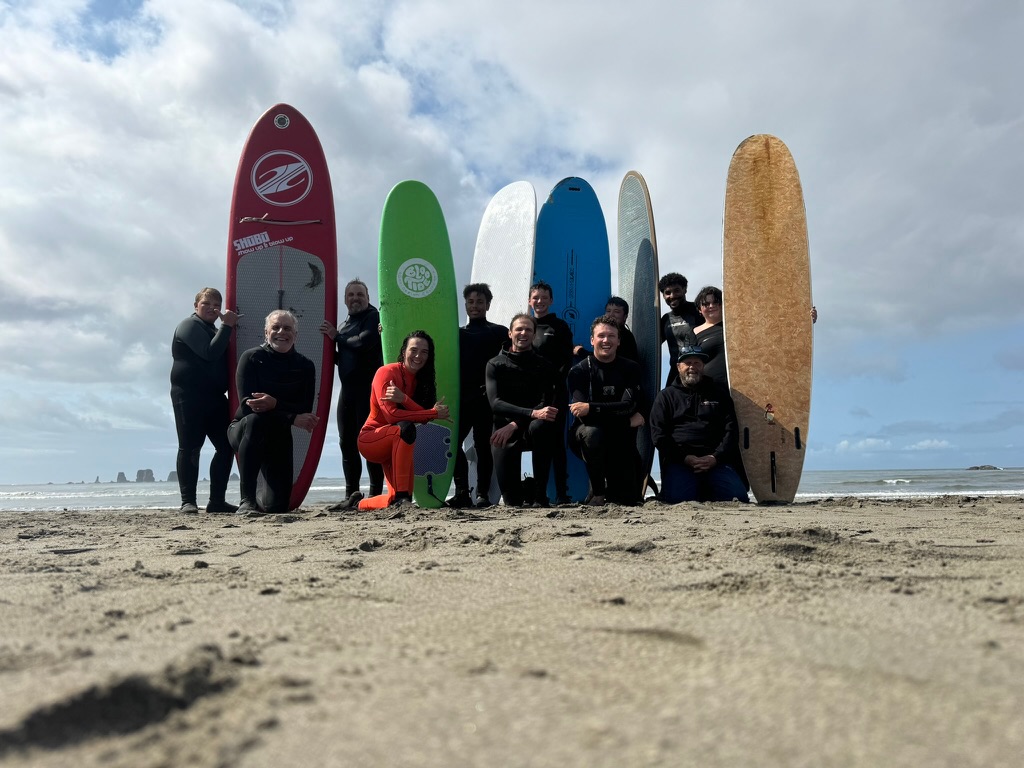Beach Reads: How Unplugging Opens The Door to Play, Curiosity, and A Love For Reading
On our surf trip to the Washington coast, we would surf in the mornings and leave the afternoons for hiking and hanging out at the various beaches. We would take snacks, drinks, games, and balls to the beach, and the guys would play, take naps, and wander by the water, exploring the wildlife and native ecosystems.
As staff on the trip, we did the unthinkable and took their phones away, creating an unstructured time at the beach. This was a time of pure joy, where we got to witness these youth just be kids-throwing the football, wrestling, building forts with intricate flooring and doors, and simply having fun. It was a beautiful sight, a stark contrast to the often-painted picture of youth as unable to function without their phones and social media. The initial struggle without the phones was a small price to pay for the beauty of watching these youth use their imaginations and curiosities to simply enjoy the beach.
Research continues to underscore the importance of limiting screen time and social media access for young people and replacing it with unstructured and unsupervised time to play. Witnessing the joy of play and creation during our beach trip was a moment that filled my cup. It was a powerful reminder of how much these students yearn to be kids, but their circumstances often do not allow them to. This experience highlighted the vital role of unstructured play in child development, a perspective that is often overlooked.

During this time on the beach, as staff, we played games with the youth, but sometimes we just sat and watched or read. I had brought my Kindle and was reading fiction on the beach when the students walked up and asked what I was doing with my tablet. The staff had told the students that we would also stay off of our devices while they did not have theirs. I was happy to show them that my Kindle allowed me to read books and could not do anything else. The students were confused by my Kindle and even more confused by why I was reading fiction.
After some time reading, one of the students walked back over and said, “Okay. We have some questions about your Kindle. Is it just one big book that keeps on going forever? Why do you read it?” It allowed me to emphasize how reading is fun, engages your imagination, and provides entertainment. The students were reluctant to say they had ever liked reading a book, I would guess because it is “not cool,” but were incredibly interested in the idea of me reading. The students continued to see me read during the day, and they started to tell me about books they had read before and liked, curious if I knew another book they might like.
Reflecting on the day, I couldn’t help but ponder why the students were so surprised to see me reading and why they were so confused about why I would be reading. It dawned on me that these students probably do not see many adults reading. Many of the adults in their lives either do not have much downtime due to working multiple jobs and taking care of their families, or they probably fill their downtime with phones and TV. This realization underscored the crucial role we, as adults, play in modeling reading behavior for the youth.

After sharing this experience with some friends and family who work in education, I was told how being read to and seeing adults read is one of the single most important markers of a child’s educational and occupational success. Adults play a crucial role in promoting reading by reading to children, providing them with books, and setting a positive example through their own reading habits. I had never considered how reading, being read to, and seeing adults read in my childhood had so significantly impacted my life, and for many of our students who are living below the poverty line they were probably not read to or encouraged to read early in their childhood and definitely not now. We often talk at YFC about how our mission is to meet the needs of students holistically, and this experience really emphasized how important this holistic approach is.
Join us in empowering young minds to overcome the limitations of their immediate surroundings and embrace a vibrant world beyond the screen!
